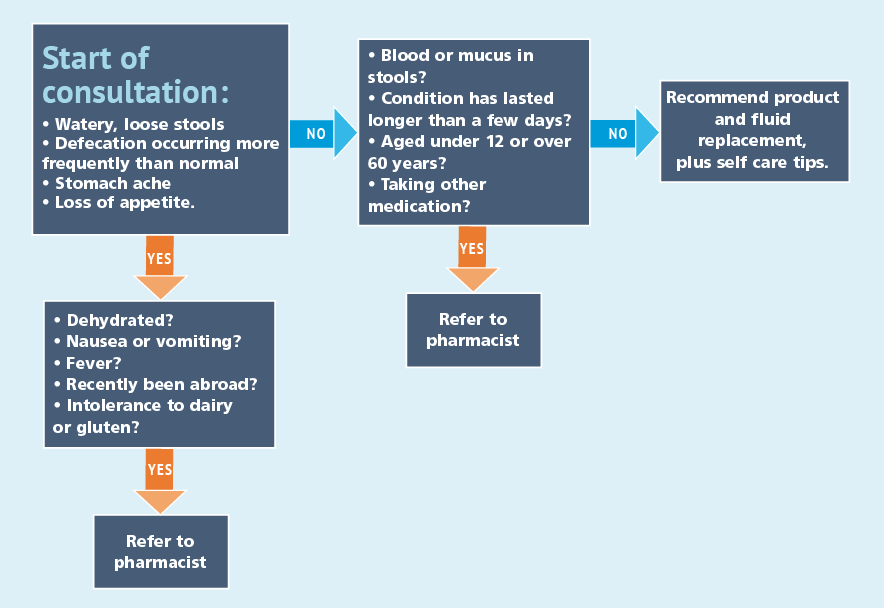10-minute clinic: diarrhoea
In Conditions
Follow this topic
Bookmark
Record learning outcomes
This handy 10-minute clinic is designed to act as a quick reference guide that will help you when advising customers in different category areas. The flowchart will lead you through the decision-making process to help you respond to customer queries. This month, we look at the advice you can offer and the products you can recommend to customers suffering from diarrhoea

At a glance

Whenever you talk to any customer, remember WWHAM:
Who is it for?
It may not be the customer who needs the treatment. Remember that antidiarrhoeals, such as loperamide, are not normally recommended for children under 12 years.
What are the symptoms?
Ask the customer to describe all of the symptoms so that you can establish whether they need to be referred. Some products may not be suitable if there are other symptoms.
How long have the symptoms been present?
This will help you find out if the diarrhoea is acute or chronic and what may have caused it. Also find out if the customer has recently been travelling abroad.
Action already taken?
This will help establish if the customer has used a product that wasn’t appropriate
or hasn’t helped.
Medication?
It is important to refer customers who are taking any other medication to the pharmacist.
You don’t have to ask these questions in order, and a customer might give you some of this information without you asking. As long as they are covered in the conversation, you should be able to find out the information you need in order to make a recommendation. The golden rule to remember is: if in doubt, refer to the pharmacist. Don’t be embarrassed to ask for their advice as they have a lot of information about products and symptoms to hand that you may not be aware of.
Persistent diarrhoea
Diarrhoea that lasts for more than two weeks is described as chronic or persistent. It can be caused by:
• A bacterial or viral infection
• Overuse of laxatives
• Poor diet
• Long-term conditions such as ulcerative colitis, Crohn’s disease, irritable bowel syndrome (IBS), lactose intolerance and coeliac disease.
Self care tips
To help prevent infection:
- Always cook food correctly and maintain good hygiene
- Regularly wash hands with hot, soapy water
- Clean the toilet with disinfectant after use.
If suffering from diarrhoea:
- Keep sipping water
- Get plenty of rest
- Eat easily digestible foods as soon as possible
- Seek further advice if there is no improvement after a day of taking an antidiarrhoeal
- Avoid dairy products and foods that are high in fat, fibre or sugar.
When to refer to the pharmacist
• If symptoms persist for more than a few days
• If the sufferer is a baby, young child or an elderly person
• If the person shows signs of dehydration (i.e. lethargy, headache, dry mouth, loose skin and, in babies, a depressed fontanelle, which is the soft gap on the top of the head)
• If diarrhoea is accompanied by a fever, severe vomiting and/or the person has recently returned from abroad
• If the stools are bloody, black or contain mucus
• If the customer has severe abdominal or rectal pain
• Customers who make repeated requests for kaolin and morphine.
Signposting
• Guts UK: 020 7486 0341
• The NHS – diarrhoea.
